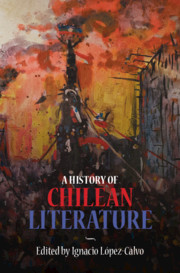Book contents
- A History of Chilean Literature
- A History of Chilean Literature
- Copyright page
- Dedication
- Contents
- Figures
- Contributors
- Acknowledgments
- Introduction
- Part I Proto-Chilean, Colonial Chronicles and Letters
- Part II Nineteenth-Century Articulations of an Embryonic National Consciousness
- Chapter 6 Rosario Orrego Castañeda (1831/4–1879) and the Proto-Feminist Writing Scene
- Chapter 7 The Feuilleton Tradition
- Chapter 8 The Historical Novel
- Chapter 9 From the Public to the Private
- Chapter 10 Literature and Literary Markets
- Chapter 11 Modernization and Culture
- Part III Beyond Chileanness: Heterogeneity and Transculturation in Canonical and Peripheral Twentieth- and Twenty-First-Century Literature
- Index
- References
Chapter 10 - Literature and Literary Markets
from Part II - Nineteenth-Century Articulations of an Embryonic National Consciousness
Published online by Cambridge University Press: 27 September 2021
- A History of Chilean Literature
- A History of Chilean Literature
- Copyright page
- Dedication
- Contents
- Figures
- Contributors
- Acknowledgments
- Introduction
- Part I Proto-Chilean, Colonial Chronicles and Letters
- Part II Nineteenth-Century Articulations of an Embryonic National Consciousness
- Chapter 6 Rosario Orrego Castañeda (1831/4–1879) and the Proto-Feminist Writing Scene
- Chapter 7 The Feuilleton Tradition
- Chapter 8 The Historical Novel
- Chapter 9 From the Public to the Private
- Chapter 10 Literature and Literary Markets
- Chapter 11 Modernization and Culture
- Part III Beyond Chileanness: Heterogeneity and Transculturation in Canonical and Peripheral Twentieth- and Twenty-First-Century Literature
- Index
- References
Summary
The task of reconstructing or synthesizing events in the Chilean literary market in the nineteenth century is undoubtedly challenging since there are multiple potential approaches. I have chosen to face the challenge by taking as a common thread the cultural press of the 1800s, which, given its material and discursive dynamism, allows us to account for the technical, aesthetic, institutional, political, and educational aspects that made possible the emergence of a specific “literary field”1 endowed with a series of “institutionalizing instances”2 that ensured its visibility and separation from other social practices.
- Type
- Chapter
- Information
- A History of Chilean Literature , pp. 197 - 215Publisher: Cambridge University PressPrint publication year: 2021



